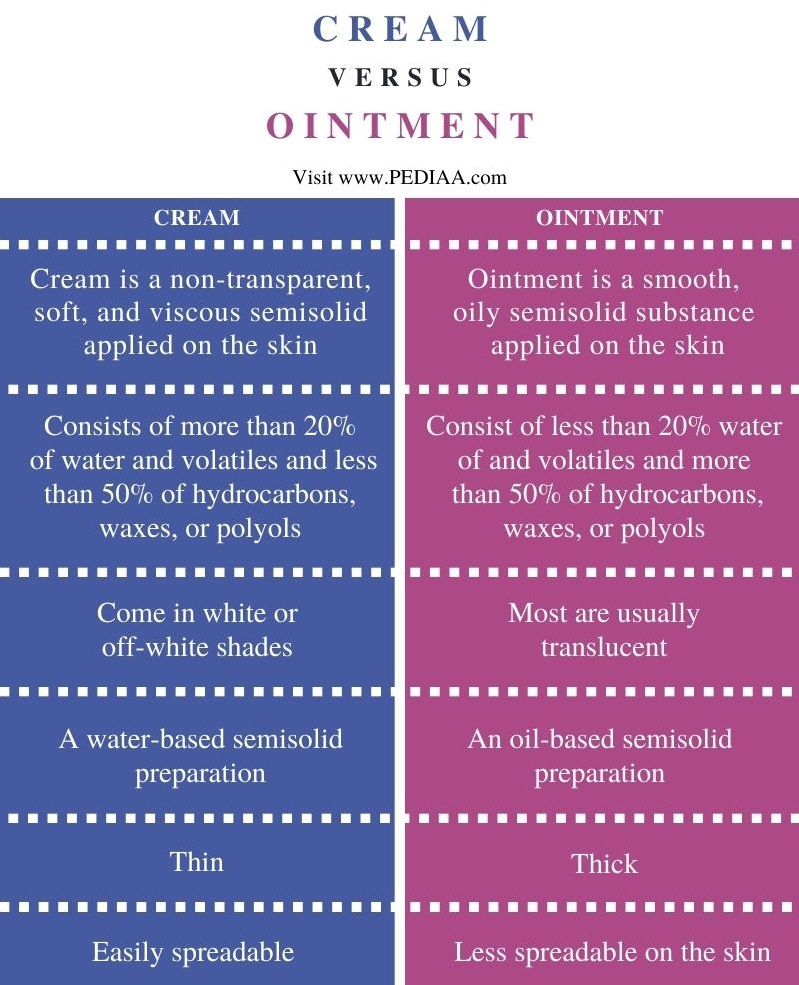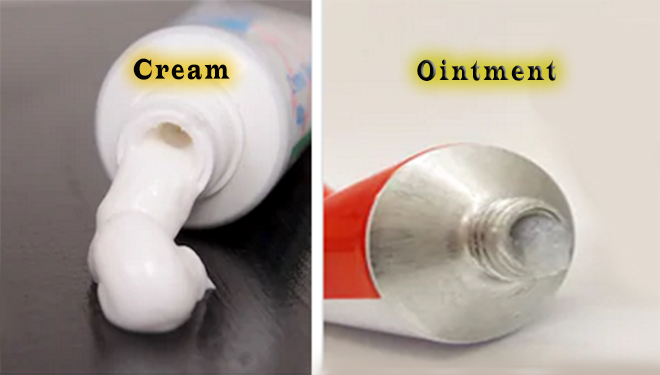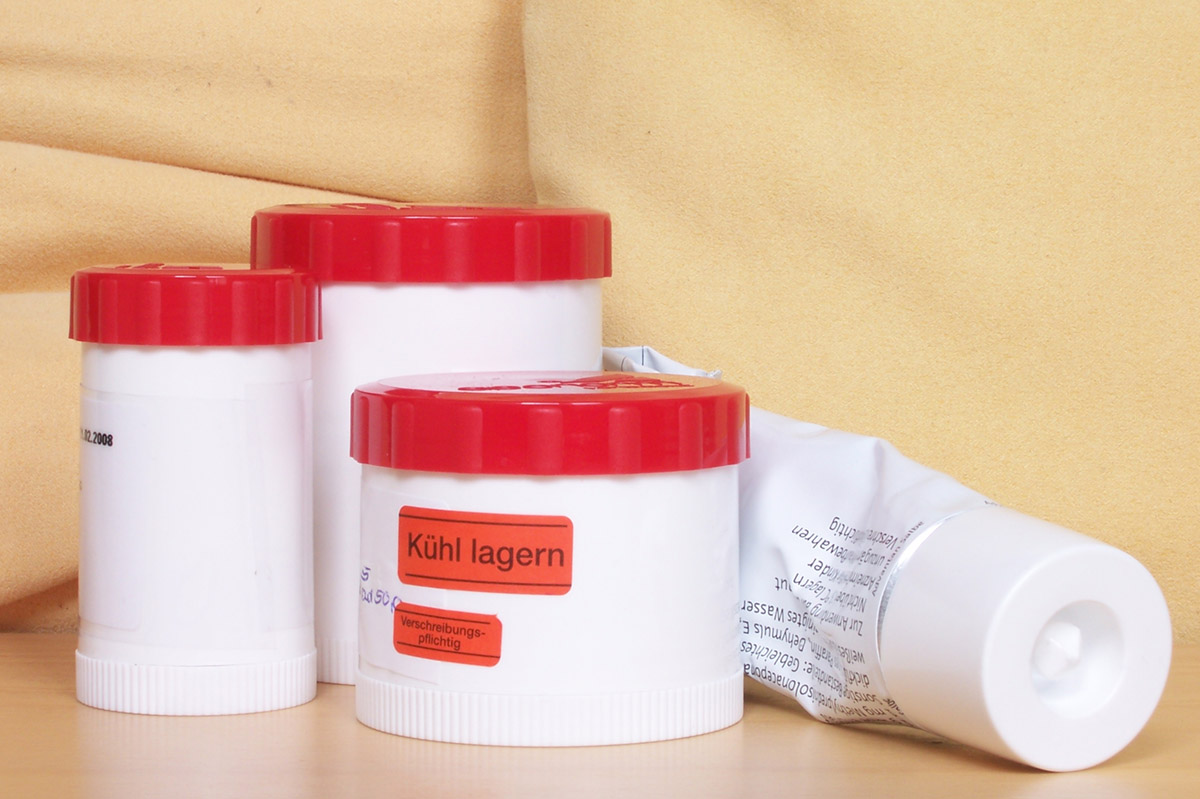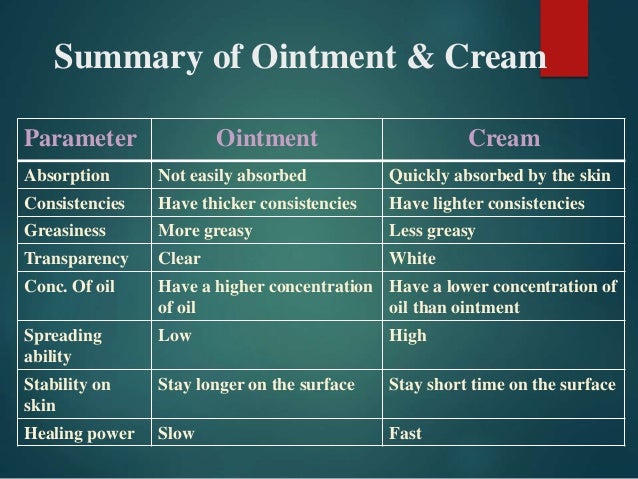This is a comprehensive guide on the difference between cream and ointment
When it comes to skincare and medication, there are numerous products available in the market to address various conditions. Two common options are cream and ointment. While they may seem similar, they have distinct characteristics that make them unique. In this article, we will explore the differences between cream and ointment, including their uses, composition, benefits, and more.
What Is Cream?

What Is Ointment?

The Differences Between Cream and Ointment
Let’s delve deeper into the specific characteristics and differences between cream and ointment.
1. Composition
Cream
Creams are formulated with a combination of water and oil, resulting in a semi-solid emulsion. Typically, creams have a higher water content, which gives them a lighter and less greasy consistency. The water component enables creams to easily spread and absorb into the skin.
Ointment
Ointments, on the other hand, are oil-based and contain little to no water. They have a greasier texture, making them more occlusive and providing a protective barrier on the skin. Ointments typically consist of a single oil or a mixture of oils, along with other ingredients that promote healing and provide therapeutic effects.
2. Uses
Cream

Ointment

3. Texture
Cream
Creams have a lightweight texture that is easily absorbed by the skin. They often leave behind a moisturizing and non-greasy feel, making them suitable for daily use. Creams are popular choices for conditions such as dryness, itching, and mild irritations. They can also be used for cosmetic purposes, such as moisturizing the face and body.
Ointment
Ointments have a thicker and greasier consistency. They provide a occlusive layer on the skin, which helps to retain moisture and protect against external irritants. Ointments are commonly used for skin conditions that require intense hydration and barrier repair, such as eczema, psoriasis, and severe dryness. They are also effective in delivering medication to the skin, as they provide a longer contact time.
4. Absorption
Cream
Due to their higher water content and lighter texture, creams are absorbed more quickly by the skin. They penetrate the outer layers easily, allowing the active ingredients to be absorbed and start working faster. Creams are suitable for conditions that require fast relief and do not need a strong occlusive effect.
Ointment
Ointments have a slower absorption rate due to their greasier texture and occlusive properties. They stay on the skin’s surface for longer periods, providing a longer duration of action. This makes ointments ideal for conditions that require prolonged contact with medication or a protective barrier.
5. Hydration Level
Cream
Creams are great moisturizers that help to hydrate the skin. Their water-based formula contributes to improving the skin’s hydration levels, making them suitable for daily use. Creams are often preferred for individuals with normal to oily skin, as they provide hydration without adding excess oiliness or greasiness to the skin.
Ointment
Ointments are highly effective in locking in moisture and preventing water loss from the skin. Their oil-based formula creates a protective barrier that seals in moisture, making them excellent for individuals with extremely dry or damaged skin. Ointments are powerful hydrators that can restore the skin’s natural moisture balance.
6. Medicinal Properties
Cream
Creams are versatile formulations that can be combined with various active ingredients. They can be customized to deliver specific medications, such as anti-inflammatory drugs, antifungal agents, or steroids. Creams are popular in dermatology for treating a wide range of skin conditions, including rashes, inflammation, acne, and fungal infections.
Ointment
Ointments are highly effective for delivering medication to the skin. The occlusive nature of ointments helps to increase the absorption of active ingredients, allowing them to penetrate deeper into the skin. Ointments are commonly used for treatments that aim to reduce inflammation, soothe irritation, and promote healing, such as in cases of eczema, psoriasis, and other chronic skin conditions.
7. Suitability for Different Skin Types
Cream
Creams are suitable for a wide range of skin types. Their water-based formula makes them ideal for individuals with normal to oily skin. They are lightweight and easily absorbed, providing hydration without feeling heavy or greasy on the skin. Creams are often preferred for daily use, as they work well under makeup and do not leave a residue.
Ointment
Ointments, on the other hand, are more suitable for individuals with dry or damaged skin. Their greasy texture and occlusive properties make them highly effective in retaining moisture and protecting against external irritants. However, ointments may feel heavy or sticky on the skin, which may not be preferred by individuals with normal to oily skin types.
8. Shelf Life
Cream
Creams generally have a shorter shelf life compared to ointments. Due to their water content, they are more susceptible to microbial growth and degradation. It is important to check the expiration date and store creams in a cool, dry place to maintain their effectiveness.
Ointment
Ointments, being oil-based, have a longer shelf life. The absence of water reduces the likelihood of microbial growth, making them more stable over time. However, it is still advisable to check the expiration date and store ointments properly to ensure their potency.
In conclusion
Creams and ointments are both valuable products in skincare and medication. Understanding their differences and unique characteristics can help you make informed decisions when choosing the most suitable option for your needs. Whether you require quick absorption, intense hydration, or targeted medication delivery, cream and ointment offer distinct benefits that can address various skin conditions effectively. Consult with a healthcare professional or dermatologist to determine the best choice for your specific requirements.
